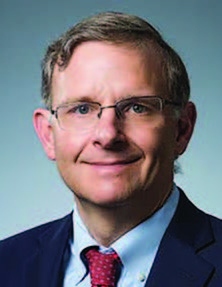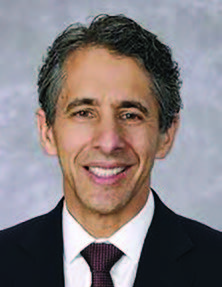Dr. St. John: During COVID-19, not everyone worked equally and some worked more so, risking their lives to greater degree, so our compensation plan was based on productivity. The model highly incentivized people to work late and do Saturday clinics. For two quarters in 2020, I made sure our overhead was split fairly among all 31 faculty members. In order to still be able to hire staff and support our academic mission, especially because we aren’t a hospital-based clinic model, we asked our donors to give what they could to our Head Neck Innovation Fund because we were being hit hard. Philanthropy is an important source of funding for our department.
Explore This Issue
March 2022JW: What were the most difficult decisions you have had to make since the start of the pandemic?
 William Armstrong, MD, chair, department of otolaryngology–head and neck surgery, University of California, Irvine School of Medicine: The biggest challenge for me as chair has been deciding how long I’m willing to do this job, and sorting out why. The number one factor is that the job has changed profoundly over the last decade. Leadership has been seriously diminished, and management has significantly increased to the point where the chairs at our institution are relegated to [the role of] middle managers. I feel like the night manager at McDonald’s who has to focus on staffing and operations but has almost no role in shaping the direction of the department. This is because all the decision making has been centralized, and meetings with the C suite and dean are “informational” meetings. This is a national trend, and I think it’s unhealthy for medicine as a whole.
William Armstrong, MD, chair, department of otolaryngology–head and neck surgery, University of California, Irvine School of Medicine: The biggest challenge for me as chair has been deciding how long I’m willing to do this job, and sorting out why. The number one factor is that the job has changed profoundly over the last decade. Leadership has been seriously diminished, and management has significantly increased to the point where the chairs at our institution are relegated to [the role of] middle managers. I feel like the night manager at McDonald’s who has to focus on staffing and operations but has almost no role in shaping the direction of the department. This is because all the decision making has been centralized, and meetings with the C suite and dean are “informational” meetings. This is a national trend, and I think it’s unhealthy for medicine as a whole.
A second factor is that I’ve been doing the job for 14 years, and I’m trying to figure out how much of what I’m experiencing is that it’s becoming routine. I love patient care and teaching; administration is a burden I tolerate, although I do get satisfaction out of seeing the department grow and faculty and residents succeed. The ability to influence has decreased significantly, however.
The third is age dynamics. I’m heading toward 60 this year and thinking about what I want to do in the last productive decade of my career. Do I want to bang heads with administration? How long do I want to fight for the faculty, and am I being an effective advocate?
 Mark Gerber, MD, division chief, otolaryngology, Phoenix Children’s Hospital: “In the beginning, it was splitting the team in half and keeping each of the teams isolated from one another. Now, here we are in the midst of a more infectious variant and the teams are mixing every day. We’ve delayed plans for adding more pediatric otolaryngologists who will ultimately be needed in the region due to the reduction of primary pediatric otolaryngology needs, and we’re unable to add support staff until more people return to the job market. Just this week, due to sick staff call-outs we’ve had to convert back to telehealth for most of our elective visits, at least for the next one to two weeks.”
Mark Gerber, MD, division chief, otolaryngology, Phoenix Children’s Hospital: “In the beginning, it was splitting the team in half and keeping each of the teams isolated from one another. Now, here we are in the midst of a more infectious variant and the teams are mixing every day. We’ve delayed plans for adding more pediatric otolaryngologists who will ultimately be needed in the region due to the reduction of primary pediatric otolaryngology needs, and we’re unable to add support staff until more people return to the job market. Just this week, due to sick staff call-outs we’ve had to convert back to telehealth for most of our elective visits, at least for the next one to two weeks.”